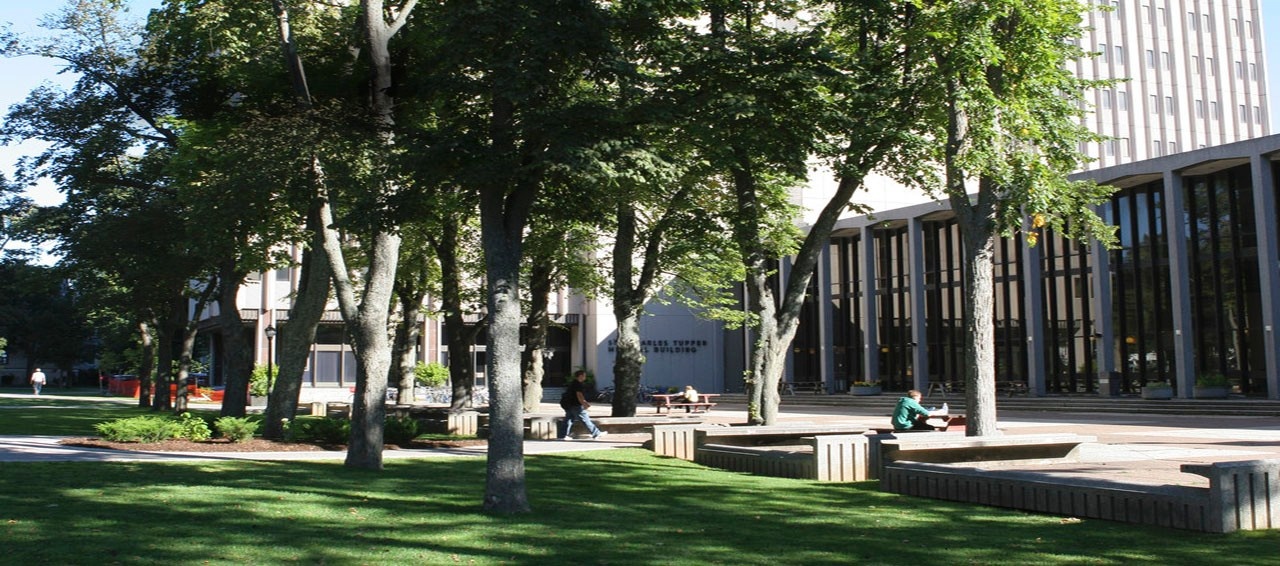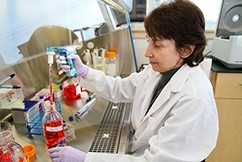Centres and Institutes
Beatrice Hunter Cancer Research Institute
A collegial, multidisciplinary research community
Dalhousie Medical School and its affiliated teaching hospitals are home to wide variety of research centres, institutes, groups and units. These exemplify the medical school’s multidisciplinary, team-based approach to tackling research problems, and the willingness of researchers to pool resources and share equipment, staff and ideas in pursuit of answers to important questions.
Health research centres
Atlantic Research Centre
The Atlantic Research Centre (ARC) was established in 1967 as a research centre for investigation of brain disorders. The ARC has evolved into an internationally-recognized research group studying the biochemistry, molecular and cell biology of lipids—in particular their role in signal transduction and vesicular transport, cancer, and infectious disease.
The ARC is a division within the Department of Pediatrics at Dalhousie Medical School and is affiliated with the IWK Health Centre. ARC Investigators are also members of the Department of Biochemistry & Molecular Biology.
Beatrice Hunter Cancer Research Institute
The Beatrice Hunter Cancer Research Institute brings together a diverse community of cancer researchers in pursuit of a common goal: to save lives and ease the burden of cancer on individuals, families and society. The institute provides a meeting place for researchers to share ideas and forge new collaborations, at Dalhousie University and across Nova Scotia, Atlantic Canada and beyond.
The Beatrice Hunter Cancer Research Institute aims to build a cancer research effort that encompasses all aspects of cancer research, transforms our understanding of cancer, pioneers major improvements in cancer prevention, diagnosis, treatment and care. Learn more about the Beatrice Hunter Cancer Research Institute.
Biomedical Translational Imaging Centre (BIOTIC)
Located in two facilities – one at the IWK Health Centre and one at the QEII Health Sciences Centre – BIOTIC is a leading-edge resource for imaging the brain. Involving several members of the Dalhousie Medical School’s faculty, BIOTIC provides the local and global neuroscience communities with access to a variety of imaging modalities and advanced technology solutions. BIOTIC’s main focus is on working in partnership with private companies to create new technologies for clinical use. Learn more about BIOTIC.
Brain Repair Centre
The Brain Repair Centre (BRC) is a research institute at Dalhousie University in Halifax, N.S., involving more than 50 principal investigators, $10 million in outside funding and 250 trainees and staff in a wide range of research pursuits. The BRC is a hub, catalyst and driver for neuroscience research, collaboration, innovation and knowledge translation in Atlantic Canada. Its mission is to provide programs and services that advance neuroscience discovery, improve clinical care and contribute to Nova Scotia’s economy through research, innovation and worldwide partnerships.
BRC members are leaders in a wide range of research areas, including Alzheimer’s disease, ALS, epilepsy, fundamental neuroscience, brain imaging, multiple sclerosis, pain, psychiatric disorders, spinal cord function, stroke, traumatic brain and spine injury and vision. Learn more about the Brain Repair Centre.
Canadian Center for Vaccinology
The Canadian Center for Vaccinology (CCfV) is a world-leading centre for the study of vaccines. Research efforts span the continuum from fundamental studies of the mechanisms of infectious disease, through to vaccine development, pre-clinical testing and clinical trials (though the Clinical Trials Research Centre, a division of the CCfV). Investigators with the centre also play a leadership role, nationally and internationally, in evaluating vaccine policy and informing policymakers regarding changes that should be made in the best interests of public health. Learn more about the Canadian Center for Vaccinology.
Solutions for Kids in Pain
Solutions for Kids in Pain (SKIP) is a national knowledge mobilization network based at Dalhousie University in Halifax, Nova Scotia.
SKIP's mission is to improve children's pain management by mobilizing evidence-based solutions through coordination and collaboration.
They work to address the gap in knowledge mobilization by bringing together:
- researchers
- patients and caregivers
- health professionals
- 48 different health institutions (including all the children’s hospitals in Canada!)
- 100+ partners from around the world
Learn more at www.kidsinpain.ca
Centre for Research in Family Health
Researchers in the Centre for Research in Family Health at the IWK Health Centre are dedicated to understanding the social and behavioral aspects of family health, while developing and testing effective support and education programs to help parents promote a family environment that facilitates children’s optimal development and mental health. Learn more about the Centre for Research in Family Health.
Healthy Populations Institute
The Healthy Populations Institute is a leading centre of excellence for population health and prevention research that informs policies and programs aimed at improving the health of Canadians. Supported by the Faculties of Health Professions, Dentistry and Dalhousie Medical School, the centre encourages interdisciplinary teamwork and facilitates large, complex projects involving collaborators from many sectors, with a focus on knowledge translation. At the same time, it provides a wealth of training opportunities for students, postdoctoral fellows and faculty members.
Investigators with the centre are exploring such important topics as youth obesity and the built environment, healthy eating and physical activity, seniors’ oral health, chronic disease prevention and food security. Learn more about the Healthy Populations Institute.
Institute for Comparative Genomics
ICG is a Dalhousie University Institute comprised of researchers and trainees in four faculties: Medicine, Science, Computer Science and Agriculture. Research carried out by ICG scientists includes:
- comparative genomics, transcriptomics and proteomics
- microbial diversity
- environmental and medical microbiomics
- development of bioinformatic and statistical tools
We are committed to training the next generation of scientists in a collaborative, equitable and inclusive environment. Visit the ICG website to learn more.
Research groups and units
Atlantic Canada Molecular Oncology Centre
The Atlantic Canada Molecular Oncology Centre is the first facility of its kind in Canada. It's a highly specialized laboratory with the capability to analyze tumour tissues from advanced-stage lung cancer patients, to identify the specific genetic mutation involved. This provides an enormous survival and quality-of-life benefit to patients with mutations that match new-generation targeted cancer therapies.
Established in 2012, the Atlantic Canada Molecular Oncology is a collaboration involving Capital Health, the National Research Council (NRC) and Dalhousie Medical School, in partnership with pharmaceutical companies including Pfizer Roche, Boehringer Ingelheim and others.
Atlantic Mobility Action Project
The Atlantic Mobility Action Project aims to restore mobility and functional abilities to people with movement disorders – primarily those whose nervous systems have been damaged by brain and spinal injuries or diseases such as ALS (Lou Gehrig’s disease), stroke, Parkinson’s disease and multiple sclerosis. It brings together a diverse group of Atlantic Canadian researchers, based largely in Dalhousie University’s Faculty of Health Professions and Dalhousie Medical School. Members range from laboratory scientists and surgeons to kinesiologists, biomedical engineers and clinical rehabilitation specialists. Learn more about the Atlantic Mobility Action Project.
Cardiovascular Research Group
Dalhousie’s Cardiovascular Research Group joins scientists with cardiac surgeons and cardiologists in a collaborative effort to better understand key issues in heart health and disease, and to develop more effective strategies for preventing and treating serious cardiovascular problems. Their research projects include developing better methods for protecting the heart during surgery, pioneering new efforts in informed consent and shared decision-making before surgery and inventing cardiac mapping technologies to improve the safety and outcomes of cardiac ablation procedures for treating arrhythmias.
Dalhousie Pain Group
The Dalhousie Pain Group brings together a diverse blend of health professionals and researchers who want to better understand, manage and treat pain of all sorts—acute procedural pain, chronic pain, neuropathic pain and other forms of pain. The research group include physicians, nurses, physiotherapists, clinical psychologists, basic scientists and others with a strong interest in exploring new approaching to pain. Members involve their trainees in regular research days and learning sessions sponsored by the group.
The Women’s Interdisciplinary Pain Group is a sub-group that links clinical psychologists, anesthesiologists and other specialists in an effort to better understand and manage women’s pain, with an immediate focus on longer-term effects of childbirth-related pain. They're developing evidence-based strategies to help reduce the negative impacts of women’s experience with pain, to help them cope better with pain and to prevent the development of chronic pain. Visit the Dalhousie Pain Group website to learn more.
Geriatric Medicine Research
Aging presents many challenges for individuals and their families, particularly when chronic illness, cognitive impairment and frailty become issues. Geriatric Medicine Research is a multidisciplinary group that explores these intertwined issues, following a long-term, multi-dimensional approach that includes clinical trials, primary mad secondary research projects, mathematical modeling, and provincial, national and international collaborations and exchanges.
Recognized leaders in geriatric medicine research, this group implemented a patient-centred research model more than a decade ago that has since become accepted as the clinical model for the study of aging. Their program of research aims to make care better for frail older adults and people with dementia.
Health Data Nova Scotia
Formerly known as the Population Health Research Unit, Health Data Nova Scotia provides researchers with access to provincial administrative health datasets—on a cost-recovery basis—to facilitate their research in the areas of health services, population health and clinical epidemiology. Housed in the Department of Community Health & Epidemiology, Health Data Nova Scotia offers researchers access to linked, anonymized data on hospital discharge abstracts, physician visits and vital statistics, as well as prescription claims for subsets of the population. This is an immensely valuable resource to researchers at the medical school. Learn more about Health Data Nova Scotia.
Hearing and Balance Research Group
The Hearing and Balance Research Group brings together basic scientists with clinical experts at Dalhousie to explore a wide range of issues involving the middle and inner ear. Working in the SENSE Lab, the Microfabrication Lab and other facilities at the QEII Health Sciences Centre, this group is focused on developing workable solutions to patients’ problems with hearing and balance. These solutions include groundbreaking new technologies, such as a bone-conduction hearing aid and endoscopic ultrasound ear probe, which have been licensed by private companies who will produce them for global use.
I3V Wave
The I3V Wave 1 Team brings together internationally-recognized strengths in infection, immunity, inflammation and vaccinology research at Dalhousie and affiliated Health Centres to provide a unique resource for preventing and combatting disease.
Maritime SPOR Support Unit
Researchers pursuing patient-oriented research can access a broad range of support services through the Maritime SPOR Support Unit (MSSU). Funded through the Canadian Institutes of Health Research’s Strategy for Patient-Oriented Research, the MSSU provides support in such areas as network-building, research methodology, data collection and analysis and more. Learn more about the Maritime SPOR Support Unit.
Multiple Sclerosis Research Unit
One of Dalhousie Medical School’s longest-standing research units, established in 1980, the Dalhousie Multiple Sclerosis Research Unit provides evidence-based MS care and education to patients and families. By collecting comprehensive data from patients through the course of their care, the unit has contributed to the understanding of MS and the effectiveness of various treatments for the various forms of the disease. The Dalhousie Multiple Sclerosis Research Unit takes part in large-scale treatment studies, as well as studies exploring the causes of MS. It's an advocate for MS education and advances in MS care locally, nationally and internationally.
Perinatal Epidemiology Research Unit
The Perinatal Epidemiology Research Unit (PERU) explores key issues affecting the health of women and their babies. Investigators in the unit are involved in studies that link large-scale databases—and collect biological markers of health from large groups of people—to explore such key issues as the impacts of excess weight gain in pregnancy on the future health of women and their children, the impact of immunization in pregnancy on newborns’ health and the effects of in-utero exposure to environmental contaminants on the health of children. PERU investigators also study health services in child and adolescent mental health, and supervise many medical students’, residents’ and graduate students’ research projects. Learn more about PERU.


